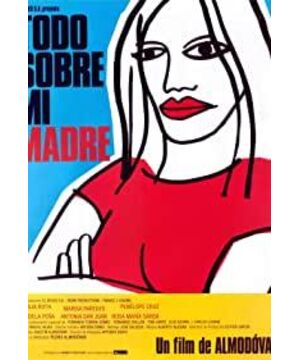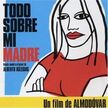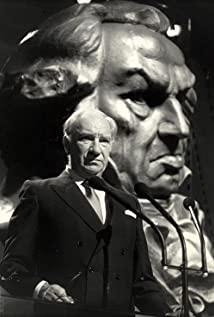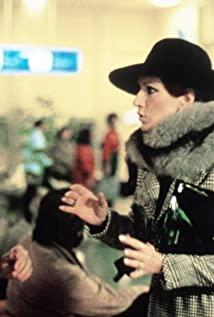I watched Almodovar's "All About My Mother". It was the first time I watched his film, and I will watch it again.
No comment for the time being, it is said that this is a film that Almodovar has achieved, and it deserves its name. He portrayed a great mother. Although I was a little uncomfortable with the fast pace of Spanish and the lack of a feminine voice at the beginning, as the plot deepened, I successfully found a point of support in this film.
Before I watched the film, I had more or less heard the phrase "everything about my mother", so when Mother's Day in 2006 was approaching, I wrote a poem of the same name. I watched the movie today, and the sadness and sentiment in it, combined with myself, made my heart unstoppable.
Manuela, a single mother over 40, has had a tragic fate. When he was young, he was a "phoenix girl" in order to make a living, and gave birth to a son with a "phoenix man". Before the child was born, she was abandoned by the irresponsible "phoenix man" and went to another city to live alone with the child. Later, she became a nurse and finally brought up the child. The child is young and handsome, likes literature and art, and wants to write a work on the theme of mother in the future. On his birthday, after receiving Dapot's book from Manuela, he went to the theater to watch the performance of "A Streetcar Named Desire". After the performance, it was raining heavily. He and Manuela waited for the actors to come out. Where, in order to want the star's autograph, he caught up with the taxi they were riding in, and ended up in a car accident. Manuela watched her son leave her on her birthday.
Although her son was lost, as a nurse, she signed an agreement to donate her son's heart. After these things were over, she resigned and decided to go to the city of the person whose son donated his heart, to feel the life that his son continued.
In this way, she came to the city where she was pregnant with a child. This is a blurred city, with taxis lingering for a while, and the scene of call girls and transgender women roaming outside the car windows, which is staggering. When preparing to leave, Manuela found her former friend Ayue, and learned that "their" former friend "Feng Nan" (Lola) had deceived the two of them, which made them resentful.
At this time, they were all out of work, and they were going to seek help from Lusa, a volunteer at the monastery. Lusa's relationship with her mother is at odds, and she fails to help Manuela. Lusa, who was planning to go to Salgado as a volunteer, found out that she was pregnant, so she couldn't go to Salgado. Before, her mother didn't let her go because there were many guerrillas there and her life was in danger at any time. But the cruel thing is that Lusa was diagnosed with AIDS, and the troublemaker was "Phoenix Man" Lola. At this time, Manuela was furious and complained that Lusa was too careless.
The story is also interspersed with the performance of "A Streetcar Named Desire". Manuela starred in a small troupe with "Phoenix Man" when she was young, so she is very emotional about this play. Moreover, her son's likes must be influenced by her, so she can recite lines when watching performances in the theater. She ran into trouble with the protagonist backstage, and helped solve the problem. The heroine was unable to play because of drug addiction, and Manuela performed well and performed wonderfully. But the heroine was of course unhappy when she was hit, and Manuela had no intention of competing and decided to go home. When the heroine's love was enough to send money at the place she rented, Manuela recommended Ayue and said that Ayue would definitely be competent. Sure enough, Ayue got rid of the previous injustice and handled things quite safely. Moreover, "she" is very humorous. When the heroine and Xianghao couldn't take the stage, "her"'s stand-up comedy-the reason why it was called A Yue was that I thought I could please the public and won the applause of the audience and the crew.
In the end, Lusa gave birth to a baby boy, and with aggressive treatment, the child is healthy. Manuela finally met Lola, who was soon to die, and "he" said sadly that he wanted to see Lusa's child. Manuela introduced the situation of "he" and Lusa's children, and painfully informed them that they also had children, and left in a car accident. Lola cried sadly after learning about it.
Lusa's child was finally handed over to Manuela, and she left the city with the child, preparing to live a single mother's life in another place.
I made a flowing description of the film, and found that I had a new understanding of the film. It is by no means fooled that it can become Almodovar's famous work, and it is by no means a cover for it to win the Oscar for Best Foreign Language Film. According to information, Almodovar's mother lived to be 83 years old, and he only returned to his hometown for the second time a year after his mother's death. His mother can be said to have given him the material and spiritual wealth of his life, which not only has an absolute influence on his life, but also the closest woman around him has created his unique perspective, which makes his films accurately reflect the relationship between women and men. A woman's life, thus gaining the reputation of "female director".
Watching the film, I found that the characters are intertwined, and factors such as prostitutes, organ transplants, AIDS, transgender people, and church volunteers all appear in the film. Moreover, the image of the mother is not single. Lusa's mother, and Lusa will give birth to the child even if she knows that the father of the child is a transgender person. The love between Manuela and her son, this film embodies the greatness of a mother. As a mother, I took the road of tolerance and free giving. I remember an inaccurate line, what a mother is, a mother is tolerance, Manuela corrected, no, tolerance is garbage.
In the end, it is not difficult to conclude that a film can care and reflect mother's love, also pay attention to transgender people, and promote AIDS. These are the factors that make it affirmative. In any case, a director who can naturally coordinate these factors and make a film that reflects human nature and human feelings will definitely have a positive impact on the lives of those who are concerned. Thank you Almodovar for letting us pay attention to maternal love, let us learn to be tolerant, and face everything with a tolerant heart.
View more about All About My Mother reviews











